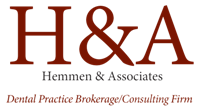Pre-Transition Tips for Successful Sale Practice
Published on
- 08-22-2024
Read Time
- 6 minutes read
Pre-Transition Tips for Successful Sale Practice

Getting close to retirement? Here are a few tips that will help make your practice more desirable and valuable in the market.
Stay on the Throttle!
When doctors approach retirement, a common challenge with practice values is that the hours of operation are decreased. Since the value of a practice is determined using the past 3 to 4 years of financials, it’s important that the practice continues producing optimal results. If at all possible, maintain your hours of production and quality dentistry and your financials will be where they need to be.
Control Your Overhead
Quick tip on just a few categories: staff, rent, supplies, and lab. Try and get these numbers down if possible. Overpaid staff members have a negative impact on net income. The annual Staff Wages Category on your P&L should be managed within a 24% to 26% range of the total annual receipts. It’s extremely difficult to have the conversation with an employee that has been with the practice for 20 plus years, that the position pays “x” amount and no more. Due to the difficulty of that conversation, most veteran employees receive increases and the annual staff wage percentage will run well beyond 26%. Supplies and lab have become very competitive; lab fees may be easily managed to 6% to 7%, and supplies in the range of 6% to 8% of your receipts.
Fee Schedule Keep your fees current; not only does it maximize your net revenue it takes the pressure off of the buyer not having to raise them immediately. This category is fairly simple to accomplish, call Henry Hemmen & Associates, Inc. for fee survey results.
Real Estate
Rent is the most negotiable expense in your business. We see dentists who have been in the same space for 10 plus years and have never renegotiated their lease. The standard increase is 3% per year and it compounds. Through the years it will increase substantially, so when you speak with your landlord, address renegotiating your lease. The worst-case scenario is that they say no. Understand the market prior to approaching your landlord and know what the current rates are. A good time to approach your landlord is about 12 months out from the expiration date. You may also hire a professional to do this for you. Since you will be transitioning your practice be sure to consult an attorney about your plans to sell and whether or not the lease language is in your favor for such an event.
Staying Modern with New Technology
Much of a practice’s value is based on financials; the equipment that is able to produce that revenue (whether or not it’s new) is the equipment that shaped that value. The challenge is buyers want “new” and because of that they may be reluctant to move forward with a purchase or may offer much less. An outdated office will be noticed immediately so you might want to consider updating it. If you are not going to sell your practice for a few years, you may benefit from the updates by writing off the expense and you will likely get a greater return when you sell your practice.
Accountant and Financial Advisor
Be sure to visit with your Accountant and your Financial Advisor to determine if you are prepared financially to transition your Practice.
Family Members in Your Practice
Having family members working in the practice is not unusual but when it comes time to sell, their employment may pose a challenge. For example, having a spouse as an office manager; nine times out of ten she/he may want to retire or leave at the same time as the seller. Having the selling doctor AND the office manager leave may be a deal breaker for a buyer. You want as little change as possible in a transition. Our suggestion is to have a succession plan in place where these members leaving will not impact the practice negatively.
